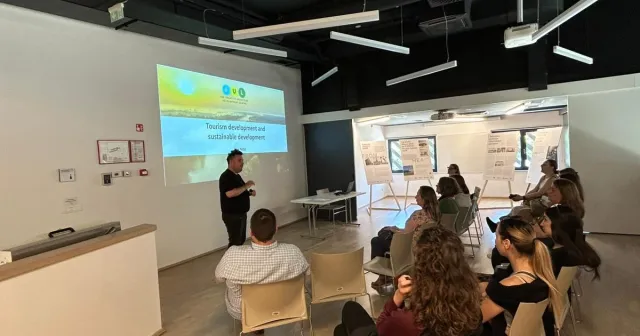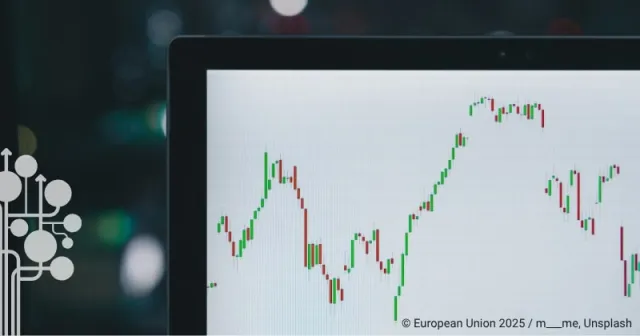Helping adults build skills for a sustainable future

Who needs sustainability-related skills?
Mark is an artificial intelligence (AI) engineer working for a high-tech start-up. Anne is a smallholder farmer who farms two hectares of land. Although their jobs do not seem to have any common characteristics or requirements, they both affect the sustainability of human-natural systems. The AI applications developed by Mark can enhance biodiversity or optimise energy consumption. On the other hand, they can threaten social sustainability, for example by replacing human labour (Usmonova, 2024). Similarly, Anne's farming practices (e.g. use of agrochemicals, choice of irrigation strategies and cultivation methods) may positively or negatively affect the health of the agroecosystem, while increasing social welfare through the production of high quality food. The extent to which Anne and Mark work in a pro-sustainable way depends largely on their skills, values and attitudes. The same is true for any professional. Developing the sustainability skills of farmers, engineers, teachers, entrepreneurs, researchers, construction workers and transport workers, to name but a few, is crucial to facilitating the transition to an economically viable, socially just and environmentally sound future.
Since the launch of the Brundtland Report (World Commission on Environment and Development, 1987), it has been recognised that in order to shape our common (sustainable) future, we must first equip people with new skills, change their value systems and help them to formulate pro-sustainable attitudes. Beyond the core vocational skills that receive the lion's share of attention from policy-makers and education and training providers, there is a need to broaden the range of adult learning provision to include sustainability-related skills if we are to pave the way for a more sustainable environment, society and economy.
A Decalogue of good practice for equipping adult learners with the skills needed to build a sustainable future
How can policy support adults with key competences for sustainability? What can the adult education and training community do to effectively develop learners' key competences? Here is a proposed decalogue of good practice for policy organisations, research institutes and adult learning providers.
- Adopt a forward-looking perspective. Skills that are considered essential for a sustainable future today may be considered outdated or even obsolete in five or ten years' time. The emergence of new risks to human-natural systems and the onset of socio-political and economic crises will require new skills to be addressed.
- Predicting possible sustainable futures. Identifying the starting points and potential destinations, and the pathways that can lead to these futures, is essential for identifying the skills needed to navigate them.
- Help adults understand the potential negative impacts of their practices on environmental, economic and social sustainability. Even the best of intentions can have negative consequences. Cultivating skills to anticipate these impacts - or their futures thinking skills, as Redman and Wiek (2021) note - and to mitigate related risks can reduce the uncertainties associated with sustainability transitions.

- Provide opportunities for adults to develop the overarching skill of unlearning and relearning. Old knowledge is often based on problematic assumptions. Unlearning and starting the learning journey anew is crucial for building sustainability related competences.
- Emphasising resilience competences. Fostering learners' ability to adapt to change, cope with uncertainty, recover from shocks and disturbances, and manage transitions to sustainability fall into this category of competences. The development of a Competency Framework for Resilience can contribute significantly in this direction.
- Establish a sustainability competence framework to describe the key competences needed to transform adults into sustainability thinkers and doers. The European Union's GreenComp (Bianchi et al., 2022) can serve as a solid basis for mapping relevant competency areas. Adding disciplinary competences associated with different professions would help to build a more robust framework.
- Continuously updating the list of competency areas included in this framework to adapt it to new threats and opportunities.
- Building alliances between academia, VET providers, practitioners and industry to stimulate a dialogue for sustainability. Multiple views of sustainability allow for a better understanding of how to achieve a sustainable future and which competences are key to enabling sustainability transitions.
- Zooming out to see the bigger picture. Understanding what prevents adults in education and training from achieving their full potential is the first crucial step in helping adults to develop competences for a sustainable future.
- Zooming in to see the bigger picture. To ensure participation in education and training programmes that pursue sustainability goals, we should first understand what motivates learners to improve their sustainability-related competences.
References
Bianchi, G., Pisiotis, U., and Cabrera, M. (2022). GreenComp: The European Sustainability Competence Framework. Publications Office of the European Union, Luxembourg. Available at: https://publications.jrc.ec.europa.eu/repository/bitstream/JRC128040/JRC128040_001.pdf
Redman, A., & Wiek, A. (2021). Competencies for advancing transformations towards sustainability. Frontiers in Education. 6, 785163, https://doi.org/10.3389/feduc.2021.785163
Usmonova, M. (2024). AI unveiled: Exploring its social impacts. Policy Brief. Institute for Advanced International Studies, The University of World Economy and Diplomacy. Available at: https://www.iais.uz/storage/files/1/Navigating_the_Social_Impact_of_Artificial_Intelligence_FINAL%203.pdf
World Commission on Environment and Development. (1987). Our Common Future. Report of the World Commission on Environment and Development. United Nations. Available at: https://sustainabledevelopment.un.org/content/documents/5987our-common-future.pdf
About Chrysanthi Charatsari
Chrysanthi Charatsari holds a Ph.D. in Agricultural Education and Extension from the Aristotle University of Thessaloniki. She has completed four post-doctoral fellowships in Agricultural Extension, Rural Sociology and Adult Education. She participates as scientific director or research associate in many projects funded by the European Union and/or national funds. Among other research activities, she has developed an adapted version of Farmer Field Schools for Greek farmers. Today she is a visiting lecturer at the Hellenic Open University and a post-doctoral researcher at the Aristotle University of Thessaloniki. She has published more than 90 papers in peer-reviewed journals, edited books and proceedings of international and national conferences. Her research interests include agricultural extension/education, agricultural innovation, digitalisation, sustainability transitions and innovative learning techniques.




